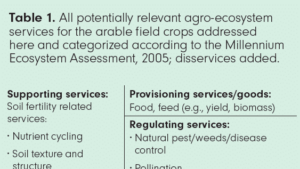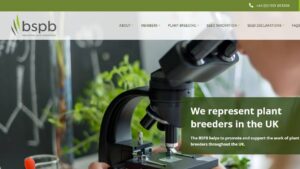A new study makes clear how important plant breeding is to the European Union.
A new study on the socio-economic value of plant breeding in the European Union clearly shows the breeding sector has a strong positive impact on growth and employment, as well as on environmental protection and biodiversity preservation.
According to study author Steffen Noleppa, plant breeding activities in the EU in the last 15 years resulted in numerous clearly measurable benefits for the economy, the environment, and also society at large.
“The results of this study should help better inform and facilitate an unbiased public debate on the importance of historic, current and future genetic crop improvements for specific socio-economic and environmental objectives,” says Noleppa, managing director of HFFA Research GmbH in Berlin.
The study, titled “The economic, social and environmental value of plant breeding in the European Union”, provides information that follows up on and supports a European Parliament report from 2014, which said the EU should play a leading role in the development of sustainable plant breeding techniques and in promoting agricultural and plant breeding research and practice.
The study provides a number of key findings that represent science-based evidence showing the numerous benefits plant breeding is offering to European society, and makes clear the socioeconomic and environmental value of plant breeding in the EU.
Productivity Growth
On average and across major crops cultivated in the EU, plant breeding contributes about 74 per cent to total productivity growth since the turn of the millennium, equal to an increase in yields by 1.24 per cent per annum.
“Considering academic literature and the obviously broad consensus in science, it becomes apparent that plant breeding across all arable crops in the EU has a tremendous impact on productivity in arable farming,” Noleppa says. “In the second half of the last century, genetic improvements were responsible for half the progress made. Since the turn of the millennium, this ratio has increased considerably.”
Based on this productivity growth, on average, yields and resulting production of arable crops in the EU would be more than 16 percent lower without genetic crop improvements, according to the study.
Stabilising Markets
Plant breeding has increased primary agricultural product supply by a significant amount, thus stabilising markets and reducing price volatility, according to the study results. Higher yields per unit of arable land increase the EU’s supply of primary agricultural products to international markets, Noleppa notes.
Because of plant breeding, “an additional 47 million tons of grains and seven million tons of oilseeds are currently produced in the EU,” he says. This contributes to not only stabilising the prices and markets, but increasing potential world food supply.
In fact, Noleppa adds, a remarkable drop in arable production would have occurred across all arable crops without plant breeding. Production losses would have been highest with sunflower seeds, cereals and some oilseeds.
“Such initial production losses would certainly affect markets. International commodity prices would change and might set alternative incentives for domestic market supply and demand leading to changing monetary outcomes for farmers and consumers, but also society as a whole. Social implications might be expected as well.”
Those include global malnutrition, reduced rural income and reduced employment in the EU.
Environmental Benefits
Plant breeding contributes to reducing greenhouse gas emissions—about 3.4 billion tons of direct CO2 emissions were avoided in Europe thanks to plant breeding innovation over the last 15 years, Noleppa found. That’s because, due to plant breeding innovations, the EU has been able to prevent natural habitat from being turned into farmland.
“All this land is sequestering carbon both above and below ground. A tremendous part of this carbon would be released into the atmosphere in the form of CO2 if that land was used for farming,” he says.
Based on his research, Noleppa also found that a lot of biodiversity would have been lost by neglecting plant breeding in the EU since the turn of the millennium on top of what has already been lost in terms of global species richness. This is equivalent to the biodiversity found in 6.6 million hectares of Brazilian rainforest and savannahs.
Industry Support
Seed industry stakeholders welcome the report’s findings, with European Seed Association secretary-general Garlich von Essen saying it shows the importance of plant breeding innovation for the EU itself, as well as its contribution to achieving overarching policy objectives like food security, environmental protection, and biodiversity preservation.
“Now we have quantitative data that proves this. It should be seen as a call-to-action to policymakers to ensure both science-based policy as well as a supportive regulatory environment that fosters and drives future innovation,” von Essen says.
“In short, this report shows that supporting plant breeding innovation is first and foremost a great investment in our economic as well as our societal future.”
Aleksandra Malyska, executive manager for Belgium-based plant sector stakeholder forum Plants for the Future (Plant ETP), says the study will serve as an important tool for the industry. Plant ETP recently hosted an official launch event for the study involving members of the European Parliament and other stakeholders, to discuss potential contributions of plant breeding to the European economy, society and environment.
“Informing political debate on the importance of genetic crop improvement for environmental and socio-economic objectives through unbiased quantitative and qualitative data is a must,” she says.
“Such science-based information should be widely available and should be a starting point when discussing the future of plant breeding in the EU.”
Malyksa notes that the sentiment among European Parliament members was that plant breeding has a key role to play if the sector wants to help meet the challenge of feeding a growing world population.
The full report can be accessed online at bit.do/plantetp-HFFAResearch.
Related content:
- Plant Breeding in the EU: New Research Highlights Benefits for Tomato and Alfalfa: https://european-seed.com/2021/07/plant-breeding-in-the-eu-new-research-highlights-benefits-for-tomato-and-alfalfa/
- Reducing Global Hunger — Utopia or Reality?: https://european-seed.com/2017/10/reducing-global-hunger-utopia-reality/
- The Tremendous Impact of UPOV Membership in Vietnam: https://european-seed.com/2019/04/the-tremendous-impact-of-upov-membership-in-vietnam/













